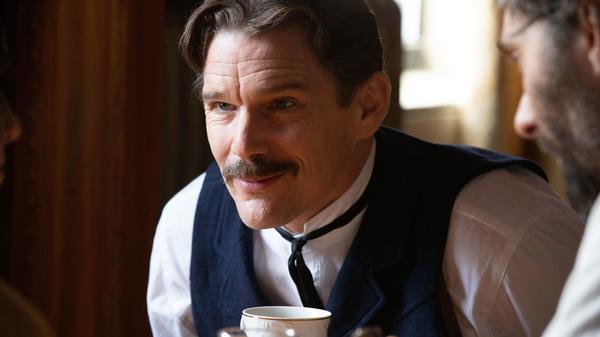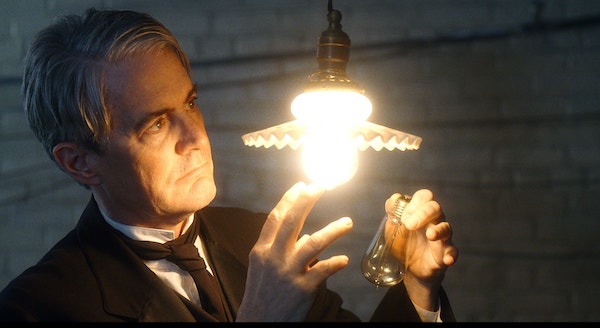Film Review: “Tesla” — The Romance of Invention
By Peg Aloi
This ambitious biopic is a valuable reminder that the films in this genre need not be formulaic or grandiose. In fact, they are at their most appealing when they channel the idiosyncrasy and mystery of their subjects.
Tesla, directed by Michael Almereyda. Rent or buy on iTunes, Google Play, and other streaming platforms and pay TV operators.

Ethan Hawke plays Serbian American inventor Nikola Tesla in the biopic Tesla. Photo: Carla Howe/ IFC Films.
This fascinating and rather unconventional biopic takes a while to find its footing, but when it does, its originality is brisk and thrilling. Tesla explores the life and work of the pioneer of electrical and mechanical wizardry, Nikola Tesla. Michael Almereyda is a prolific though not especially well-known director. His stylish black-and-white vampire flick Nadja burst on the scene in 1994 with a wacky cast and a hipster vibe. He’s directed some interesting modern Shakespeare fare (including his Hamlet with Ethan Hawke and Kyle MacLachlan, who star in Tesla as Nikola Tesla and Thomas Edison, respectively). More recently, Marjorie Prime put Lois Smith and Jon Hamm into a futuristic story that felt like an uber-naturalistic episode of Black Mirror. I’ve a feeling that Tesla, despite or perhaps because of its idiosyncratic aesthetics and anachronistic flourishes, may attract viewers who were not previously familiar with Almereyda’s considerable body of work.
Tesla’s story is told, interestingly, by a young woman. The voice-over and straight-to-the-camera narration is supplied by Anne Morgan (played by played by Irish actress Eve Hewson), daughter of millionaire financier J. P. Morgan. She is a constant reminder that funding for the inventor’s work was a bugaboo that plagued him throughout his entire career. Anne was also a would-be paramour of Tesla, whose solitary life reflects the habits of a man devoted to his work above family and domestic concerns. Still, the constant presence of the beautiful, unconventional Anne as a helpmeet kept at arms length, as well as a brief mutual fascination with actress Sarah Bernhardt (Novitiate‘s Rebecca Dayan), suggests that he appreciated women, even if he didn’t know how to fit them into his life.
The film delves deeply into Tesla’s brief partnership and lifelong rivalry with Thomas Edison, played as an amicable yet sometimes perversely cruel workaholic by Kyle MacLachan. I like this casting: MacLachlan has become an iconic pop culture figure because of his roles in a number of strange genre films, including Blue Velvet, Dune, and Twin Peaks. His Edison has a disarming smile and a smug manner; he wears light-colored clothing that gives him the air of a Southern dandy at times. His Edison is also capable of unexpected bouts of self-deprecation after colossal personal failures (such as losing most of his wealth in a failed mining operation). The film imagines the two men caught up in competition that, for Tesla, is partly about earning Edison’s respect and affection. Anne narrates their imagined meetings and reconciliations as moments that, had they actually occurred, might have profoundly shifted Tesla’s fortunes. Edison’s famed practice of sleeping less than four hours per night, and expecting his employees to do the same, is balanced against frequent shots of Tesla awakening, fully clothed, shoes still on, in a pristine white bed with a notebook and pen. It’s as if Tesla’s failure to win Edison’s approval fed his obsession with the senior inventor, down to imitating his odd quirks.
Viewers may find the film’s narrative to be a bit fractured and contrived at first but, once you become comfortable with the voice-over and intimate narration by Anne, the decision to prevent Tesla from telling his own story makes sense. Apparently, the man was given to fanciful bragging, spinning stories about inventions he’d only dreamt of as if they were imminent achievements. As Tesla, Hawke affects a deep and gravelly voice; his inventor reacts like a deer-in-the-headlights to basic social niceties. His connection to physical reality is disjointed: food, drink, sleep, and social contact interrupt the flashes of genius from his shimmering mind. Anne’s fascination with this odd man is at least partly borne of her wanting to escape the all-too-proper and privileged constraints of her birthright.

Kyle MacLachlan plays Thomas Edison in Tesla. Photo: Cara Howe/IFC Films.
Some of the film’s most striking and moving moments occur in Anne’s presence, as when she flips open a laptop and discusses Google search results for the various inventors portrayed. (Tesla has a surprisingly thin slate of results compared to Edison. He is dwarfed by Marconi, whose “invention” of radio utilized over a dozen of Tesla’s patents.) Other anachronisms are briefly trotted out, but they’re not exploited as clever devices; rather, they provide valuable reminders of how overwhelmingly pervasive Tesla’s inventions are in the modern world. Anne grounds Tesla’s flights of fancy in the reality of patents and funding and investors: obviously, she’d have made a perfect partner for him. Yet she offers little help when Tesla must humiliate himself asking her father for money. She matter-of-factly describes his penniless legacy, even though her longing for a relationship with him shapes her world.
Nikola and Anne’s scenes together have a palpable chemistry.In one lengthy scene, as they are eating dinner together, her gaze lingers on Tesla’s inscrutable face. The background music is ethereal, bucolic, and, perhaps to some, faintly familiar. It is the main theme from Wojciech Kilar’s haunting score for Jane Campion’s Portrait of a Lady. Performed by composer John Paesano, whose original composition is the score for the rest of the film, the tune’s melancholy flutes and insistently plaintive melody are almost instantly recognizable, suggesting parallels to Campion’s portrayal of a privileged woman who longs for an unconventional life. This recycling of another film’s score might seem strange, even lazy, but the music works beautifully for this scene, and fits well with the rest of the film’s eclectic soundscape. The production design by Carl Sprague (Professor Marston and the Wonder Women) is full of bold and unusual choices that hint at a low budget, which, of course, has been known to inspire boundless creativity. Tesla’s overall look is dreamy, with occasional excursions into the fantastical. The artful cinematography by Sean Price Williams (Her Smell) is well complemented by the nimble editing of Kathryn J. Schubert (Marjorie Prime). This ambitious biopic is a valuable reminder that the films in this genre need not be formulaic or grandiose. In fact, they are at their most appealing when they channel the idiosyncrasy and mystery of their subjects. Tesla is nothing if not inventive.
Peg Aloi is a former film critic for the Boston Phoenix and member of the Boston Society of Film Critics. She taught film studies in Boston for over a decade. She writes on film, TV, and culture for web publications like Vice, Polygon, Bustle, Mic, Orlando Weekly, Crooked Marquee, and Bloody Disgusting. Her blog “The Witching Hour” can be found at themediawitch.com.
Tagged: Ethan Hawke, Kyle Maclachlan, Michael Almereyda, Nikola Tesla

[…] Ethan Hawke plays Serbian American inventor Nikola Tesla in the biopic, Tesla. Photo: Carla Howe/ IFC Films. This fascinating and rather … View full source […]